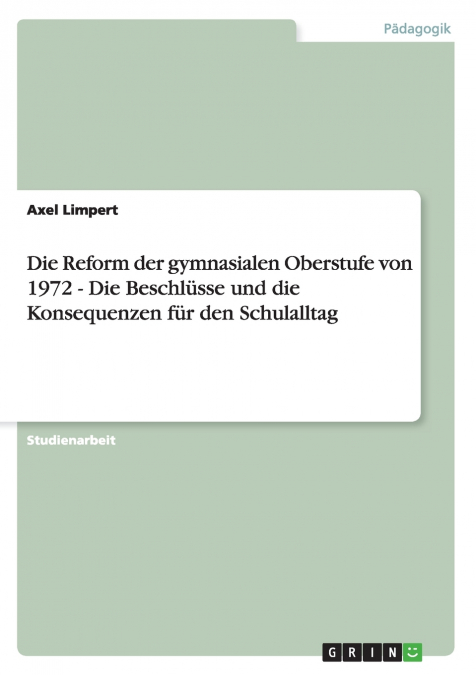
Axel Limpert
Studienarbeit aus dem Jahr 2003 im Fachbereich Pädagogik - Schulwesen, Bildungs- u. Schulpolitik, Note: 1-, Universität Duisburg-Essen (Fachbereich 2), Sprache: Deutsch, Abstract: Die reformierte gymnasiale Oberstufe ist das Produkt der Bildungsdiskussion der 50er- und 60er-Jahre. Dreh- und Angelpunkt der Debatte war auf der einen Seite die Erkenntnis, dass eine positive wirtschaftliche Entwicklung eng an die Qualität der Bildung geknüpft ist und auf der anderen Seite die Argumentation, dass Bildung als Grundrecht einer demokratischen Gesellschaft zu verstehen sei, wobei der Begriff der Chancengleichheit an Aktualität gewann. (Roth 2001:405) Die Reform der gymnasialen Oberstufe von 1972 war deshalb brisant, weil ein seit 1810 bestehendes System verändert wurde. Es waren folgende Gründe für die Reform ausschlaggebend: Die Universitäten forderten eine bessere Vorbereitung auf das Studium. Ein Ziel war also die Optimierung der Studierfähigkeit. (Roth 2001:407) Der Vorrang der Allgemeinbildung- einst die wesentliche Säule der Gymnasien - war veraltet, da die Inhalte der Fächer zugenommen hatten und diese sich nicht mehr auf ein gemeinsam Verbindliches konkretisieren ließen. (Roth 2001:407) Weiterhin hatte das Fächerangebot an den Universitäten in einer solchen Fülle zugenommen, dass das Angebot in der Schule erweitert werden musste. (Roth 2001:407)Die „Vereinbarung zur Gestaltung der gymnasialen Oberstufe in der Sekundarstufe II' wurde von der „Ständigen Konferenz der Kultusminister der Länder' (KMK) 1972 beschlossen: Nach einer Phase von Schulversuchen - die herkömmliche gymnasiale Oberstufe (HGO) und die neugestaltete gymnasiale Oberstufe (NGO) liefen in diesem Zeitraum parallel - wurde diese Reform ab dem Schuljahr 1976/77 verbindlich. (Hitpaß 1985:13)